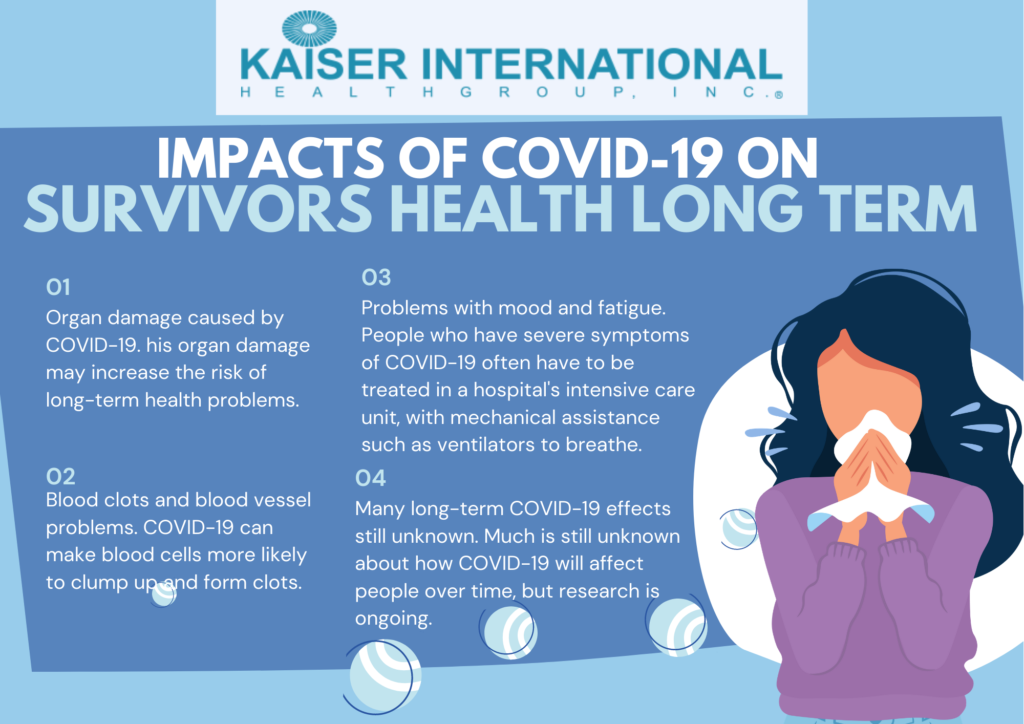Most people who had COVID-19 recover completely within a few weeks. But some people, even those who had mild versions of the disease, continue to experience symptoms after their initial recovery.
These people sometimes describe themselves as “long haulers” and the conditions have been called post-COVID-19 syndrome or “long COVID-19.” These health issues are sometimes called post-COVID-19 conditions. They’re generally considered to be effects of COVID-19 that persist for more than four weeks after you’ve been diagnosed with the COVID-19 virus.
Older people and people with many serious medical conditions are the most likely to experience lingering COVID-19 symptoms, but even young, otherwise healthy people can feel unwell for weeks to months after infection.
Organ damage caused by COVID-19
Although COVID-19 is seen as a disease that primarily affects the lungs, it can damage many other organs as well. This organ damage may increase the risk of long-term health problems. Organs that may be affected by COVID-19 include:
- Heart. Imaging tests taken months after recovery from COVID-19 have shown lasting damage to the heart muscle, even in people who experienced only mild COVID-19 symptoms. This may increase the risk of heart failure or other heart complications in the future.
- Lungs. The type of pneumonia often associated with COVID-19 can cause long-standing damage to the tiny air sacs (alveoli) in the lungs. The resulting scar tissue can lead to long-term breathing problems.
- Brain. Even in young people, COVID-19 can cause strokes, seizures, and Guillain-Barre syndrome, a condition that causes temporary paralysis. COVID-19 may also increase the risk of developing Parkinson’s disease and Alzheimer’s disease.
Some adults and children experience multisystem inflammatory syndrome after they have had COVID-19. In this condition, some organs and tissues become severely inflamed
Blood clots and blood vessel problems
COVID-19 can make blood cells more likely to clump up and form clots. While large clots can cause heart attacks and strokes, much of the heart damage caused by COVID-19 is believed to stem from very small clots that block tiny blood vessels (capillaries) in the heart muscle.
Other parts of the body affected by blood clots include the lungs, legs, liver, and kidneys. COVID-19 can also weaken blood vessels and cause them to leak, which contributes to potentially long-lasting problems with the liver and kidneys.
Problems with mood and fatigue
People who have severe symptoms of COVID-19 often have to be treated in a hospital’s intensive care unit, with mechanical assistance such as ventilators to breathe. Simply surviving this experience can make a person more likely to later develop post-traumatic stress syndrome, depression, and anxiety.
Because it’s difficult to predict long-term health outcomes from the new COVID-19 virus, scientists are looking at the lB effects seen in related viruses, such as the virus that causes severe acute respiratory syndrome (SARS).
Many people who have recovered from SARS have gone on to develop chronic fatigue syndrome, a complex disorder characterized by extreme fatigue that worsens with physical or mental activity but doesn’t improve with rest. The same may be true for people who have had COVID-19.
Many long-term COVID-19 effects still unknown
Much is still unknown about how COVID-19 will affect people over time, but research is ongoing. Researchers recommend that doctors closely monitor people who have had COVID-19 to see how their organs are functioning after recovery.
Many large medical centers are opening specialized clinics to provide care for people who have persistent symptoms or related illnesses after they recover from COVID-19. Support groups are available as well.
It’s important to remember that most people who have COVID-19 recover quickly. But the potentially long-lasting problems from COVID-19 make it even more important to reduce the spread of COVID-19 by following precautions. Precautions include wearing masks, social distancing, avoiding crowds, getting a vaccine when available, and keeping hands clean. Don’t be afraid to seek medical help, it is one of the best things that you can do for yourselves.
If you’re looking for a health care provider that can cater to your medical needs, check out Kaiser International Health Group. They are based here in the Philippines and they provide health care needs whether it be for the short term or long term health. Get Kaiser Health Care today!
